Today is All-Hallows Eve and as we prepare to celebrate the great Feast of All Saints, and in response to several requests for me to clarify the teaching of the Church on the Communio Sanctorum and its Scriptural foundations, I offer this reflection. This will be posted on the Unam Sanctam blog to invite criticisms from all and sundry and allow the response to reach a wider audience. This is in no way exhaustive and as the One-Mediator objection or the necromancy objection comes up, we'll delve into that further by the primary purpose of this reflection is the Scriptural foundations of the Communio Sanctorum.
PS
If you have a problem with the Bible translation (MKJV is used here), fault the KJV only-ers. I'm using the MKJV because its slightly more intelligible than the KJV. Since the other versions that I used were deemed 'tak-laku' or invalid by them, I had no choice. Pls feel free to use another translation to compare the readings. I recommend RSV(NRSV only if you must) or the Jerusalem(the old one not the new one). Protestants may use the NASB which is more faithful than the NIV.
The concept of the Communion of Saints is not, as you might think, a supplementary aspect of the Catholic Faith. Its actually an integral part of the Faith and the foundation of which it rests is the Church and the very Nature of God Himself which is what is at stake here. The Communio Sanctorum permeates every part of Catholic teaching and is crucial for an authentic understanding of the nature of the Church, Her Liturgy and Sacraments and God's very plan of Salvation itself and the Redemptive mission of Our Lord Jesus Christ. Whoever denies the doctrine of the Communion of Saints not only separates himself from the Faith of the Church as handed down to us by the Apostles but also has a very skewed view of God Himself as He is manifested and revealed by Jesus His Son, His Final Word of Revelation, as well as through the Holy Scriptures which the Church has Canonized, venerated and preserved through the centuries as the inspired God-breathed Word.
But first, we must be very clear about one thing, namely that our invoking the intercession and prayers of Mary and the saints does in no way confer any greater glory on them that God has already bestowed.
And Mary said, My soul magnifies the Lord, and my spirit has rejoiced in God my Savior. For He looked on the lowliness of His slave woman. For, behold, from now on all generations shall count me blessed. For the Mighty One has done great things for me; and holy is His name. (Luk 1:46-49)
But as it is written, "Eye has not seen, nor ear heard," nor has it entered into the heart of man, "the things which God has prepared for those who love Him." (1Co 2:9)
No matter what we do, we just can't beat that. No gift we give and no honour be bestow can beat the gifts of the Great Gift-Giver Himself that "Eye has not seen, nor ear heard" and it is because of the graces that The Lord has poured forth of the saints, His servants, that we rightly call them Blessed. The the Blessed Virgin Mary exclaimed in the Magnificat Canticle "from now on all generations shall count me blessed. For the Mighty One has done great things for me". And thus too we call her Blessed for "the Mighty One has done great things for me". And so we can exult with her "holy is His name!".
We ask for their prayers and intercessions just as we ask one another and other Christians here on earth to pray for us and intercede for us. Besides our prayer warriors here on earth, Catholics also ask for intercessions from our mighty prayer warriors who are with the Lord in Heaven. The asking for prayers and intercessions, Scripture tells us is "good and acceptable in the sight of God our Savior".
First of all, then, I exhort that supplications, prayers, intercessions, and giving of thanks be made for all men, for kings and all who are in authority, so that we may lead a quiet and peaceable life in all godliness and reverence. For this is good and acceptable in the sight of God our Savior, (1Ti 2:1-3)
No Christian on earth, when asked to pray and intercede for another will respond "How dare you ask me to pray and intercede for you? Why can't you approach God alone and need me to pray for you? Know that there is only ONE Mediator between God and Man, the Man Jesus! You unscriptural idolater you, reducing the Mediatorship of Christ and His redeeming and atoning death on the Cross with you most impious request! Anathema Sit!!"
We honour the relics and sacred images of the Saints, besides the fact that God chooses to work miracles through them, (And it happened as they were burying a man, behold, they spied a band. And they threw the man into the grave of Elisha. And the man went down and touched the bones of Elisha, and revived and stood up on his feet. (2Ki 13:21); So as to carry out the sick into the streets and place them on cots and mattresses, so that at least the shadow of Peter passing by might overshadow some of them. (Act 5:15); And God wrought special miracles by the hands of Paul: So that from his body were brought unto the sick handkerchiefs or aprons, and the diseases departed from them, and the evil spirits went out of them. (Act 19:11-12)) because they remind us of these men and women, friends of God who walked with Him and serve as models to us of what it means to give up yourself totally to Christ. Holy Mother Church raises up those whom God has raised up and She presents them as a model for us to imitate, just as the Scriptures teach:
Be imitators of me, even as I also am of Christ. (1Co 11:1)
Brothers, be imitators together of me, and mark those who walk this way, for you have us for a pattern. (Phi 3:17)
Do those things which you have also learned and received and heard and seen in me. And the God of peace shall be with you. (Phi 4:9)
And you became imitators of us and of the Lord, welcoming the Word in much affliction, with joy of the Holy Spirit, (1Th 1:6)
By God's grace and His election, the bodies of the Saints became temples of the Holy Spirit in Baptism and they now reign with the Blessed Trinity in Heavenly Glory.
Do you not know that you are a temple of God, and that the Spirit of God dwells in you? If anyone defiles the temple of God, God shall destroy him. For the temple of God is holy, which you are. (1Co 3:16-17)
Or do you not know that your body is a temple of the Holy Spirit in you, whom you have of God? And you are not your own, for you are bought with a price. Therefore glorify God in your body and in your spirit, which are God's. (1Co 6:19-20)
Let me present the very different views of God as held by the Catholics, Greek Orthodox, Oriental Orthodox(the last two, although is schism with the Catholic Church or 950 years(since 1054) and 1650 years(since Chalcedon in 451) respectively has retained much of the Faith of the Catholic Church and presents an insight of the belief and practices of the ancient Church) and other ancient Christians who have heard and inherited the Faith once-for-all delivered unto the Saints and the Protestants who appeared on the scene with Martin Luther in the 16th century. These ancient Churches have faithfully preserved the practice of the veneration of the saints, and especially of the Blessed Virgin Mary, as the model of the Christian life, our elder brothers and sisters in the Faith who had trod the path that we are going down now and have finished the race and received the crown of glory. They serve as heroes and role models for us as well as the source of powerful intercession as friends of God.
And it was so, that after the LORD had spoken these words unto Job, the LORD said to Eliphaz the Temanite, My wrath is kindled against thee, and against thy two friends: for ye have not spoken of me the thing that is right, as my servant Job hath. Therefore take unto you now seven bullocks and seven rams, and go to my servant Job, and offer up for yourselves a burnt offering; and my servant Job shall pray for you: for him will I accept: lest I deal with you after your folly, in that ye have not spoken of me the thing which is right, like my servant Job. So Eliphaz the Temanite and Bildad the Shuhite and Zophar the Naamathite went, and did according as the LORD commanded them: the LORD also accepted Job. (Job 42:7-9)
An analogy, presented in the aptly named book by Patrick Madrid entitled "Any friend of God's is a friend of mine" defly sums up this difference of views. To paraphrase him, imagine you're going to see the a King and are being brought before him into the Throne Room. As you're walking, you immediately notice the beautiful and melodious music wafting through the air and when you step into the room, you're dazzled by the beauty of the place, the wall hangings and sculptures and paintings on the walls, the crystal chandeliers casting a warm glow over the radiant faces of the Kings courtiers and servants, his Lords and Ladies in their finery and shimmering clothes, the mosaics and rich carpets on the floors. As you progress closer to the centre, to where the King sits, the grandeur and majesty of the room, the people and everyhting grows accordingly until you finally reach the foot of the throne and behold the King himself, radiant in his glory, far more majestic and glorious than anything or anyone in the room. You're overwhelmed by the glory of the crown, his scepter and throne, this vestments but the King himself is the focal point of all the beauty and glory surrounding him. You can see that this King, confident in his glory, lavishes generously his wealth and love and beauty on those who he loves who surround and magnify him. He is glorified in them as well and they derive their glory from him.
Now imagine you're entering the throne room of a different King. There's no sound, no music, nothing hanging on the white washed walls, no carpet, no sculptures, no people, no nothing =). There's literally nothing in the room that can possibly distract your attention from the King who sits on high magnificently on his throne in the far end of the room under a spotlight whilst everything else is kept at a modest darkness. Why is this room barren of everything and why are there no courtiers surrounding this King? Because this King is jealous of his glory. He does not want you to become distracted by anything else. He wants you to only see him.
Now, which King is more glorious, more majestic? Obviously, the first. The beauty of his surroundings, the sculptures and paintings and courtiers all reflect the great glory of the King and the majesty that permeates his surroundings testifies to his glory. This analogy summarizes the two very different views of God in relation to His creatures that Catholics, Orthodox and other ancient Christians have versus the Protestants. The Catholic view of God is of an artist who revels in joy when people admire his work, his painting and sculptures, commenting on their beauty and perfection and the artistry of their maker. The Protestant view is of an artist-God who screams at the museum and art gallery goers and those who admire the night sky and the beauty of a sunrise or sunset when they admire his work: "Look at me! Look at me! I made them, dont look at them, look at me!".
In the Catholic Church, as the Divine Praises sing, "Blessed be God in His angels and in His saints". God the Creator and Artist is glorified in this creation and in His works, His genius and artistry is revealed. When people marvel at His works, He is praised and glorified. Those who admire His works, like the Blessed Virgin Mary, admire nothing but the handiwork of God her Saviour and Redeemer and Creator.
Its a bitter irony that this doctrine of the Communion of the Saints, meant to signify the close bond of union between all Christians in Christ, has become a source of division in the Body of Christ and broken the very unity that is at its very core.
Now, the crunch is this. "Is is Scriptural to ask the saints in Heaven to pray(intercede) for us?" Catholics, Orthodox of all stripes and other ancient Churches affirm this teaching, knowing that in Baptism, we're united in Christ as His Body and we're commanded to love and pray for each other and that nothing, not even death, can separate us from the love of Christ. So, Catholics on earth can ask Christians in heaven, their brothers and sisters in Christ, united by Baptism in Christ's love who have undergone the trials we are facing and and run and finished the race we're running, to pray and intercede for them.
Protestants deny this truth arguing that asking for the intercession of Mary and the saints violates Christ's unique Mediatorship, pointing towards 1Tim 2:5 "For God is one, and there is one Mediator of God and of men, the Man Christ Jesus". They think that asking for the intercession of the saints is in direct conflict with this verse and the objection is frequently expressed as "Since we already have Jesus, why do we need Mary and the saints? We can just go directly to Jesus".
Of course we can go directly to Jesus and we DO! The Saints and Mary herself are creatures whereas the Man Jesus is Creator and there is an infinite difference between them. But it is because of Jesus the Mediator that we can be intercessors for one another. We go directly to God, but through the Saints to Him as well, NOT in substitute of. Thats an important difference. And this asking for intercession pleases God the Father.
As with many ancient doctrines common to the Catholic, Greek Orthodox and Oriental Orthodox Churches, Protestant objections to them are often based on misconceptions of what these doctrines usually entail. And its also the fault of many Catholics that we often do not take the effort and the time to disabuse our Protestant friends of their misconceptions and caricatures of this Catholic teaching.
The Communion of the Saints is aptly summed up by St Paul "We... are one body in Christ and individually parts of one another" (Rom. 12:5). Catholics believe membership in Christ's Body means a personal relationship with Jesus and, through him, with all Christians so that, as the sins of one wounds the many, so too the prayers of one builds up the other parts of Christ's Body, the Church.
But I exhort you, brothers, for the sake of the Lord Jesus Christ and for the love of the Spirit, that you strive together with me in your prayers to God for me, that I may be delivered from those disbelieving in Judea, and that my service which I have for Jerusalem may be accepted by the saints; so that I may come to you with joy by the will of God, and may be refreshed with you. (Rom 15:30-32)
For God is my witness, whom I serve with my spirit in the gospel of His Son, that without ceasing I make mention of you always in my prayers, making request if by any means now at length I might have a prosperous journey by the will of God to come to you. For I long to see you, so that I may impart to you some spiritual gift, to you for the establishing of you. And this is to be comforted together with you by our mutual faith, both yours and mine. (Rom 1:9-12)
Pray in the Spirit at all times with every kind of prayer and request there is. For the same reason be alert with every kind of effort and request for all the saints. Pray also for me, so that, when I open my mouth, the right words will be given to me. Then I will boldly make known the secret of the gospel, for whose sake I am an ambassador in chains, desiring to declare it as boldly as I should. (Eph 6:18-20)
Who now rejoice in my sufferings for you, and fill up that which is behind of the afflictions of Christ in my flesh for his body's sake, which is the church: Whereof I am made a minister, according to the dispensation of God which is given to me for you, to fulfil the word of God; Even the mystery which hath been hid from ages and from generations, but now is made manifest to his saints: To whom God would make known what is the riches of the glory of this mystery among the Gentiles; which is Christ in you, the hope of glory: Whom we preach, warning every man, and teaching every man in all wisdom; that we may present every man perfect in Christ Jesus: Whereunto I also labour, striving according to his working, which worketh in me mightily. (Col 1:24-29)
Since St Paul teaches that "For even as we have many members in one body, and all members do not have the same function, so we the many are one body in Christ, and each one members of one another. (Rom 12:4-5)", the Church believes that being incorporated into Christ's Body, the Church, through Baptism, we are in communion with Jesus and through Him, we are also in communion with all other parts of His Body, all other Christians. Its not the "only me and Jesus" mentality promoted by many Evangelicals and Pentacostals today that emphasizes only the individual's relationship with Christ(the most important of the commandments) while neglecting the relationship between the individual believer and others(the 2nd most important commandment) but the very Scriptural corporate reality of the Church and its place in the plan of Salvation that is consistent with Old Testament corporate models of salvation through the family of Noah, the tribe of Abraham, the nation of the 12 tribes of Israel and the Kingdom of David. The righteousness of one(Abraham, Noah, etc) saves the lot(ie. the tribe in Abraham's case and Noah's familiy) and the sins of some results in the destruction of the whole(eg the destruction of Judah and Israel). The Church also believes that this communion is a very real bond, since its made in Christ, and endures even after death since it is the love of Christ that sustains it.
Since the Catholic Church and most Protestants agree the Scriptures are the inspired, authoritative and inerrant Word of God, we need to use the Scriptures as our common point of reference. To be effective in explaining the communion of saints to Protestants, Catholics must know how to present the Scriptural foundations of the doctrine. However, most Protestants remain unmoved in their objections even in the face of a thoroughgoing biblical defense of a Catholic doctrine as I have been wont to provide, even when their objections fail and their resonings refuted. But what the Protestant really disagrees with is the Catholic interpretation of verses, thus moving the argument beyond the "It's not in the Bible" category to the subjective "I don't agree with your interpretation of these verses" category. This attitude stems from Protestantism's fatal flaw, Sola Scriptura, the notion that the Bible is the sole rule of faith, independent of Tradition or the Magisterium.
Protestants often demand that Catholics substantiate their beliefs in Scripture (the old "show me where it says that in the Bible" routine), yet when the demanded biblical evidence is produced, the Catholic conclusion is nonetheless rejected as "unscriptural." Since they reject the concept of an infallible interpreter of Scripture, whether it be the Church or an individual, Protestants can only put forth their own opinions on what they think Scripture means. They have no way of knowing for certain if their interpretation of the Bible is correct.)
The Catholic and Scriptural position on the teaching of the Communion of Saints rests on four pillars:
(1) The Church the Mystical Body of Christ;
(2) There is only One Body of Christ, not one body on earth and another body in heaven;
(3) Nothing can separate us from the Love of Christ, not even death;
(4) Christians must love and serve each other as the Lord has commanded and are bound by the Rule of Love.On these four pillars I will show from the Scriptures, which Catholics and Protestants together hold, the idea of the Communion of Saints.
Lets look at the points individually.
The Church is the Mystical Body of Christ;
Paul's use of the body as an image to describe the unity Christians have with Christ and each other is particularly vivid: "For even as we have many members in one body, and all members do not have the same function, so we the many are one body in Christ, and each one members of one another. (Rom 12:4-5)" The phrase "and each one members of one another" is foundational for the Catholic understanding of the Communion of Saints, that every Christian is part of each other by virtue of membership in Christ. We are in Him and through Him, become part of all other Christians and thus forming His One Body, the Church. Of course, Christians who have left this world in Christ's friendship are even more closely linked to Christ and to us, the Church on earth.Our Lord alluded to this unity when he prayed, "And I have given them the glory which You have given Me, that they may be one, even as We are one, I in them, and You in Me, that they may be made perfect in one; and that the world may know that You have sent Me and have loved them as You have loved Me.(Joh 17:22-23)".
Now, besides the fact that Muslims often use the "Christ said that "that they may be one, even as We are one," and uses this as proof that "You have sent Me and have loved them as You have loved Me" and since this is patently false as the Protestants are hopelessly divided and thus by their own Scriptures prove that Christ is NOT sent by the Father, Christ used this teaching on the One-ness of the Body united in Him and the analogy of Himself as the Vine and we as its branches to illustrate the organic and very real bond Christians share:
I am the True Vine, and My Father is the Vinedresser. Every branch in Me that does not bear fruit, He takes away. And every one that bears fruit, He prunes it so that it may bring forth more fruit. Now you are clean through the Word which I have spoken to you. Abide in Me, and I in you. As the branch cannot bear fruit of itself unless it remains in the vine, so neither can you unless you abide in Me. I am the Vine, you are the branches. He who abides in Me, and I in him, the same brings forth much fruit; for without Me you can do nothing. (Joh 15:1-5)
This is also the Catholic teaching that we can only intercede for each other through the Great Intercessor, Christ Jesus. We can only mediate for each other through the One Mediator, Christ Jesus. And thus, Christ says "for without Me you can do nothing". We can only ask the Saints for prayers and intercessions because they are in Him.
The Catholic teaching, preserved from the time of the Apostles, that the Church is Christ's Body is emphasized throughout the New Testament in manifold places:
For we, the many, are one bread and one body; for we are all partakers of that one bread. (1Co 10:17)
And He has put all things under His feet and gave Him to be Head over all things to the church, which is His body, the fullness of Him who fills all in all. (Eph 1:22-23)
by which, when you read, you may understand my knowledge in the mystery of Christ) which in other ages was not made known to the sons of men, as it is now revealed to His holy apostles and prophets by the Spirit, that the nations should be fellow heirs, and of the same body, and partaker of His promise in Christ through the gospel. (Eph 3:4-6)
There is one body and one Spirit, even as you are called in one hope of your calling, (Eph 4:4)
But that you, speaking the truth in love, may in all things grow up to Him who is the Head, even Christ; from whom the whole body, fitted together and compacted by that which every joint supplies, according to the effectual working in the measure of each part, producing the growth of the body to the edifying of itself in love. (Eph 4:15-16)
Therefore putting away lying, let each man speak truth with his neighbor, for we are members of one another. (Eph 4:25)
For the husband is the head of the wife, even as Christ is the head of the church; and He is the Savior of the body. (Eph 5:23)
For we are members of His body, of His flesh, and of His bones. "For this cause a man shall leave his father and mother and shall be joined to his wife, and the two of them shall be one flesh." This is a great mystery, but I speak concerning Christ and the church. (Eph 5:30-32)
And He is the Head of the body, the church, who is the Beginning, the First-born from the dead, that He may be pre-eminent in all things. (Col 1:18)
And let the peace of God rule in your hearts, to which you also are called in one body, and be thankful. (Col 3:15)
Perhaps the clearest teaching the the Church is the Body of Christ Himself and He identifies the Church with His Body is:
And Saul, still breathing out threatenings and slaughter against the disciples of the Lord, went to the high priest and asked letters from him to Damascus to the synagogues; so that if he found any of the Way, whether they were men or women, he might bring them bound to Jerusalem. But in going, it happened as he drew near to Damascus, even suddenly a light from the heaven shone around him. And he fell to the earth and heard a voice saying to him, Saul, Saul, why do you persecute Me? And he said, Who are you, lord? And the Lord said, I am Jesus whom you persecute. (Act 9:1-5)
Persecution of the Church, Christ's Body means persecuting Christ Himself since He is in the Church and the Church in Him.
Christians are bound together and no one may say to another that he is not needed. We are called to keep in mind one another in adversity for we ae bound together in Christ Jesus, as Hebrews 13 says.
Let brotherly love continue. Do not be forgetful of hospitality, for by this some have entertained angels without knowing it. Remember those who are in bonds, as bound with them, those who suffer adversity, as being yourselves also in the body. (Heb 13:1-3)
And the the light of the passage below, that we are "the body of Christ, and members in part", and that "if one member suffers, all the members suffer with it; if one member is glorified, all the members rejoice with it" why is it so hard to accept the Catholic teaching that the Saints pray for us in our difficulties if we ask them to and rejoice with us when we triumph over sin and return to the Lord.
But much rather the members of the body seeming to be weaker are necessary. And those members of the body which we think to be less honorable, on these we put more abundant honor around them. And our unpresentable members have more abundant propriety. For our presentable members have no need, but God tempered the body together, giving more abundant honor to the member having need; that there not be division in the body, but that the members should have the same care for one another. And if one member suffers, all the members suffer with it; if one member is glorified, all the members rejoice with it. And you are the body of Christ, and members in part. (1Co 12:22-27)
The second principle on which the Catholic teaching of the communion of saints rests is:
There is only One Body of Christ, not one body on earth and another body in heaven;
All Christians, whether on Earth, in Purgatory or in Heaven(There are no elect in Hell) are part of this One Body of Christ.
But now in Christ Jesus you who were once afar off are made near by the blood of Christ. For He is our peace, He making us both one, and He has broken down the middle wall of partition between us, having abolished in His flesh the enmity (the Law of commandments contained in ordinances) so that in Himself He might make the two into one new man, making peace between them; and so that He might reconcile both to God in one body by the cross, having slain the enmity in Himself. (Eph 2:13-16)
For as many as were baptized into Christ, you put on Christ. There cannot be Jew nor Greek, there is neither bond nor free, there is no male nor female; for you are all one in Christ Jesus. (Gal 3:27-28)
Jesus Himself speaks of this unity that Christians have, the unity that He shares with the Father as we are in Him and are thus One.
And I do not pray for these alone, but for those also who shall believe on Me through their word, that they all may be one, as You, Father, are in Me, and I in You, that they also may be one in Us, so that the world may believe that You have sent Me. And I have given them the glory which You have given Me, that they may be one, even as We are one, I in them, and You in Me, that they may be made perfect in one; (Joh 17:20-23)
And let the peace of God rule in your hearts, to which you also are called in one body, and be thankful. (Col 3:15)
Jesus has only one Body - not one on earth and another one in heaven as these Scriptures show. All Christians, including those in heaven, are members of that one body. The cause of this One-ness of all Christians is because they are incorporated in Christ and are thus united by His Love because in Baptism, they live in Him. It is in Him that we live and we live because Christ lives in us. And so the Catholic Church believes.
For in Him we live and move and have our being, (Act 17:28a)
for even if He was crucified out of weakness, yet He lives by the power of God. For indeed even we are weak in Him, but we shall live with Him by the power of God toward you), examine yourselves, whether you are in the faith, prove your own selves. Do you not know your own selves, that Jesus Christ is in you, unless you are reprobates? (2Co 13:4-5)
I have been crucified with Christ, and I live; yet no longer I, but Christ lives in me. And that life I now live in the flesh, I live by faith toward the Son of God, who loved me and gave Himself on my behalf. (Gal 2:20)
Nothing can separate us from the Love of Christ, not even death;
Our Lord Jesus Christ defeated Death by His Resurrection.
The last enemy made to cease is death. For He put all things under His feet. But when He says that all things have been put under His feet, it is plain that it excepts Him who has put all things under Him. (1Co 15:26-27)
For this corruptible must put on incorruption, and this mortal must put on immortality. But when this corruptible shall put on incorruption, and when this mortal shall put on immortality, then will take place the word that is written, "Death is swallowed up in victory. O death, where is your sting? O grave, where is your victory?" (1Co 15:53-55)
Now thanks be to God, who always causes us to triumph in Christ, and He revealing through us the odor of the knowledge of Him in every place. For we are to God a sweet savor of Christ, in those being saved, and in those being lost; (2Co 2:14-15)
But it is now having been manifested by the appearing of our Savior Jesus Christ, who has made death of no effect, bringing life and immortality to light through the gospel; (2Ti 1:10)
Through Christ and in His victory over death, natural death cannot separate Christians from Christ or from each other. This is the very teaching of St Paul himself when he writes in the Letter to the Romans:
Who shall separate us from the love of Christ? Shall tribulation, or distress, or persecution, or famine, or nakedness, or peril, or sword? As it is written, "For Your sake we are killed all the day long. We are counted as sheep of slaughter." But in all these things we more than conquer through Him who loved us. For I am persuaded that neither death, nor life, nor angels, nor principalities, nor powers, nor things present, nor things to come, nor height, nor depth, nor any other creature, shall be able to separate us from the love of God which is in Christ Jesus our Lord. (Rom 8:35-39)
The Scriptural position, as taught by the Catholic Church, is that nothing, not even death itself which Our Lord Jesus has already conquered, can separate us from Christ and break the bond that we share through Him with all the elect, all the Christians whether in Heaven, Purgatory or on Earth(The Church Triumphant, Suffering and Militant).
When those who do not believe in the Communion of the Saints say that the Saints in Heaven cant hear us or know whats going on or intercede for us or pray for us, what they're really saying is that WE have no need for them.
For them, Scripture says:
For the body is not one member, but many. If the foot shall say, Because I am not the hand, I am not of the body; is it therefore not of the body?(And so, if the Christian on earth says to the ones in Heaven, you're not on earth therefore you're not part of the Church or the Body are they therefore not part of the Body?) And if the ear shall say, Because I am not the eye, I am not of the body; is it therefore not of the body? If all the body were an eye, where would be the hearing? If all hearing, where would be the smelling?(And if all the church were just merely on Eath, then what about the Saints in Heaven?) But now God has set the members, each one of them, in the body as it has pleased Him. And if they were all one member, where would be the body? But now indeed many are the members, yet only one body.(Even though the Saints are in Heaven, they still comprise the One Body of Christ) And the eye cannot say to the hand, I have no need of you; (And neither can we on earth say to the ones living in Christ in Heaven, I dont need you) nor again the head to the feet, I have no need of you. But much rather the members of the body seeming to be weaker are necessary. And those members of the body which we think to be less honorable, on these we put more abundant honor around them. And our unpresentable members have more abundant propriety. For our presentable members have no need, but God tempered the body together, giving more abundant honor to the member having need; that there not be division in the body, but that the members should have the same care for one another. And if one member suffers, all the members suffer with it; if one member is glorified, all the members rejoice with it. And you are the body of Christ, and members in part. (1Co 12:14-27)
This is a very important and oft forgotten part of Scripture, the unity of the Church where ever the Church may reside. Paul chides Christians who think they don't need other Christians. Catholics believe this applies to Christians in heaven too.Christians must love and serve each other as the Lord has commanded and are bound by the Rule of Love.
The last pillar on the Scriptural foundation of the Catholic belief of the Communion of Saints is that Christians, whether on earth or in Heaven must love and serve each other as the Lord has commanded and are bound by the Rule of Love. The 2nd greatest commandment, aside from loving God is love of each other. On these two commanments stand the whole Law and the entire message of the Prophets.
Jesus said to him, You shall love the Lord your God with all your heart, and with all your soul, and with all your mind. This is the first and great commandment. And the second is like it, You shall love your neighbor as yourself. On these two commandments hang all the Law and the Prophets. (Mat 22:37-40)
And Jesus answered him, The first of all the commandments is, "Hear, O Israel, the Lord our God is one Lord; and you shall love the Lord your God with all your heart, and with all your soul, and with all your mind, and with all your strength." This is the first commandment. And the second is like this: You shall love your neighbor as yourself. There is no other commandment greater than these. (Mar 12:29-31)
This Law is the Law of Love(and is also known as charity for the KJV'ers). This is the greatest of the theological virtues as expressed in 1st Corinthians 13:
Though I speak with the tongues of men and of angels, and have not charity, I have become as sounding brass or a tinkling cymbal. And though I have prophecies, and understand all mysteries and all knowledge; and though I have all faith, so as to move mountains, and do not have charity, I am nothing. And though I give out all my goods to feed the poor, and though I deliver my body to be burned, and have not charity, I am profited nothing. Charity has patience, is kind; charity is not envious, is not vain, is not puffed up; does not behave indecently, does not seek her own, is not easily provoked, thinks no evil. Charity does not rejoice in unrighteousness, but rejoices in the truth, quietly covers all things, believes all things, hopes all things, endures all things. Charity never fails. But if there are prophecies, they will be abolished; if tongues, they shall cease; if knowledge, it will be abolished. For we know in part, and we prophesy in part. But when the perfect thing comes, then that which is in part will be caused to cease. When I was an infant, I spoke as an infant, I thought as an infant, I reasoned as an infant. But when I became a man, I did away with the things of an infant. For now we see in a mirror dimly, but then face to face. Now I know in part, but then I shall fully know even as I also am fully known. And now faith, hope, charity, these three remain; but the greatest of these is charity. (1Co 13:1-13)
If we are called to love one another here on earth even when "now we see in a mirror dimly" how much more is the love of our brothers and sisters in heaven who see God "face to face". How much more mjust their love for us be? Scripture says "For we know in part", so, imagine the fullness of love that the saints experience "when the perfect thing comes" when we are with God in heaven.
ThisLaw of Love is emphasized in the New Testament at every turn, especially in the form of intercessory prayer. St Paul exhorts Christians to pray, supplicate, petition, and intercede for all people. He emphasizes that intercessory prayer "is good and pleasing to God our savior" (1 Tim. 2:1-4). Similar exhortations permeate the New Testament:
Now I beseech you, brethren, for the Lord Jesus Christ's sake, and for the love of the Spirit, that ye strive together with me in your prayers to God for me; That I may be delivered from them that do not believe in Judaea; and that my service which I have for Jerusalem may be accepted of the saints; (Rom 15:30-31)
But we had the sentence of death in ourselves, so that we should not trust in ourselves, but in God who raises the dead; who delivered us from so great a death, and does deliver; in whom we trust that He will yet deliver us, with you also helping together by prayer for us, so that the gracious gift by many persons be the cause of thanksgiving through many for us. (2Co 1:9-11)
We give thanks to God and the Father of our Lord Jesus Christ, praying always for you, since we heard of your faith in Christ Jesus, and of the love you have to all the saints, For this cause we also, since the day we heard, do not cease to pray for you, and to desire that you might be filled with the knowledge of His will in all wisdom and spiritual understanding, that you might walk worthy of the Lord to all pleasing, being fruitful in every work and increasing in the knowledge of God, (Col 1:3-4;9-10)
See Acts 8:24; 2 Cor. 13:7; Phil. 1:9; Gal. 5:13, 6:2; Eph. 4:32; 1 Thess. 3:10-12, 4:9-18, 5:14-15, 25; 2 Thess. 1:3, 3:1; 1 Tim. 2:1-4; 2 Tim. 1:3-4; Heb. 3:19, 13:18; Jas. 5:16; 1 Pet. 1:22, 3:8; 1 John 4:7-21; 2 John 5.) My fingers are getting tired.If, while on earth, Paul could say, "Brothers, truly my heart's desire and prayer to God for Israel is for it to be saved." (Rom 10:1) and "that without ceasing I remember you in my prayers night and day,"(2Ti 1:3), is there any reason to imagine that upon entering heaven Paul's charity and desire for others' salvation would be quenched and his prayers for others cease? Not at all. The many Scriptural exhortations to mutual charity apply to all Christians, so they must apply to Christians in heaven. Consider these admonitions regarding charity:Bear one another's burdens, and so you will fulfill the Law of Christ. (Gal 6:2)Let love be without hypocrisy, shrinking from evil, cleaving to good; in brotherly love to one another, loving fervently, having led one another in honor. (Rom 12:9-10)
Let no one seek his own, but each one another's. (1Co 10:24)
But regarding brotherly love, you do not need that I write to you, for you yourselves are taught by God to love one another. And indeed you do it toward all the brothers who are in all Macedonia. But we beseech you, brothers, that you abound more and more, (1Th 4:9-10)
Therefore comfort one another, and edify one another, even as you also do. Now we exhort you, brothers, warn those who are unruly, comfort the faint-hearted, support the weak, be patient toward all. See that none gives evil for evil to anyone, but always pursue the good, both towards one another and towards all. (1Th 5:11;14-15)
I would like to conclude with a stirring account of the Communio Sanctorum in action. Reading through Chapter 11 of Hebrews, we go through the list of the Old Testament Saints. St Paul's Letter to the Hebrews 11:1-3 begins, "Now faith is the substance of things hoped for, the evidence of things not seen. For by it the elders obtained a good report. By faith we understand that the ages were framed by a word of God, so that the things being seen not to have come into being out of the things that appear."
Then St Paul lists the great saints of the Old Testament family of God, the Old Testament Church, beginning with the first martyr, Abel, who offered an acceptable sacrifice. And then Enoch and then Noah and then Abraham, Isaac, Jacob and Sarah. And then it goes on to talk about Abraham some more and Isaac and Jacob and all the sufferings they endured because their hope was ultimately not in the earthly Jerusalem but in the heavenly Jerusalem, not in the earthly Promised Land but in the heavenly Promised Land.
Then in verse 23 it speaks about Moses and all that he gave up in order to gain this glorious inheritance in heaven, and likewise, Israel. And then Rahab, the harlot in Jericho: even her faith is extolled. Then Gideon, Barak, Samson, Jethro, the Judges, David the king, Samuel and the Prophets who through faith conquered kingdoms and forced justice, received promises, stopped the mouths of lions and quenched raging fires, escaped the edge of the sword, won strength out of weakness, became mighty in war, put foreign armies to flight. All other great deeds are being recounted not just to go through history but principally, as you will see, to inspire greater faith, hope and love within us.
Verse 36, "And others had trial of cruel mockings and scourgings; yes, more, of bonds and imprisonments." And the original readers of this epistle, could relate to all that. They were stoned, sawed in two and killed with the sword. They went about in skins of sheep and goats, destitute, afflicted, ill-treated, of whom the world, this world, that is, was not worthy. Wandering over deserts and mountains and in dens and caves of the earth. And all these, the well-attested by their faith, did not receive what was promised, since God has foreseen something better for us, that apart from us they should not be made perfect.
So, in a sense, the coming of Christ and the New Covenant economy brought great blessing and glory for these Old Testament saints, greater glory than they received just simply when they died. Something new was inaugurated when Christ was raised, when he was ascended and when he was enthroned. He opened up a new door, the front door of heaven, for his younger brethren to come home. And we will see how this glorious family kingdom in heaven has placed within it thrones and on them sit these great saints, as well as the New Covenant saints. And they are priests and they are giving judgment to serve Christ and to pray on our behalf.
But notice that the writer of Hebrews is recounting all of this to inspire us to emulate their example. This is going to be one fundamental consideration as we understand the scriptural rationale for the veneration of the saints. Heroic examples inspire heroic virtue. But let's take a look now at Hebrews 12, "Therefore," in one of the most basic interpretive principles of Biblical studies that whenever you see that word, "therefore," you ask yourself what it's there for because it basically sums up everything before it and draws a very practical conclusion, especially so in the Book of Hebrews. "Therefore since we also are surrounded with so great a cloud of witnesses, let us lay aside every weight and the sin which so easily besets us, and let us run with patience the race that is set before us, looking to Jesus the Author and Finisher of our faith, who for the joy that was set before Him endured the cross, despising the shame, and sat down at the right of the throne of God. For consider Him who endured such contradiction of sinners against Himself, lest you be weary and faint in your minds. You have not yet resisted unto blood, striving against sin. And you have forgotten the exhortation which speaks to you as to sons, "My son, despise not the chastening of the Lord, nor faint when you are rebuked by Him?"
And it goes on to talk about the discipline of the Lord and the chastening and the suffering which is proper for children of God to mature and grow up. Then in verse 12 and 13, "Because of this, straighten up the hands which hang down and the enfeebled knees. And make straight paths for your feet, lest that which is lame be turned out of the way, but let it rather be healed."
The whole picture in Hebrews 12 is the big race and who's in the crowd? All of the saints. And what do they form? Verse 1, "so great a cloud of witnesses." It's a cloud that's a crowd for the purpose of cheering us on.
You know, why is it that the Man Utd has a much better home record than with away games? Why is that? Why consistently even do relegation teams do better at home games than away games? Because their people are there. You could say, "They know the stadium better." Perhaps. But there's always an incredible psychological edge especially in the champions league games to be playing at home.
You know, and basketball teams and football teams know, even person taking the bets for a match will tell you that if it's a home game "pang pua liap" for the home team. And here we have a home game and there's a huge cloud of witnesses, all our older family members are cheering us on. It isn't like we've got family members who have never run the race before, saying, "Go for it. Go for it," although they've never gone for it. I mean these people raising up their hands, cheering and looking and you can see the scars on their hands and their feet and their faces and on their backs. You know that they've run the race and finished the race and they are calling you to do the same.
And the greatest and loudest cheerleader of them all is Jesus himself, the pioneer and perfecter of our faith, the "the First-born among many brothers", Romans 8:29 tells us. The whole stadium is full of our family. And it inspires in us fortitude and courage, vigour and sacrifice. A second wind if you like.
But not so. If the saints don't know what we're doing, and we have no idea what they're doing. In other words if we have no contact, no communication, this kind of description is just simply a weak and quaint metaphor. But that's not what it is. This is the spiritual reality perceived by the eyes of faith, the eyes that are open to the spiritual truths of this great Credo statement, "I believe in the Communion of Saints."
And so, as we prepare to celebrate this great Feast, let us call to mind the example of our brothers and sisters, our role models and heroes, these friends of God, this great cloud of witnesses that surrounds us and cheers us on. And remembering this, let is gird up our loins and finish the great race that is set before us as we pray for the grace to accomplish what the saints have accomplished through the strength that comes from God and through the prayers and intercessions of all God's children, on earth and in Heaven.
Amen.
Given on the All-Hallows Eve, Vigil of the Feast of All Saints 2005.
2 hours ago
![[Unam Sanctam]](https://blogger.googleusercontent.com/img/b/R29vZ2xl/AVvXsEiymQ2adTjpZ1ABhPBbBBquiPCxeQrc4Jy_97vOikT0wGQeJleriiXQy6ebnb0jrYe-TfvcK77txStB4aIwVAdD41ZdMkVfNtFGC0JX6LBV9B8mfeRZaIAM7Sj-011ag3DiKQzv/s1600/headerdivinemercy.jpg)












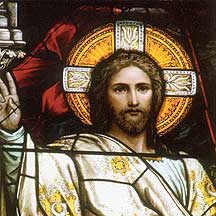







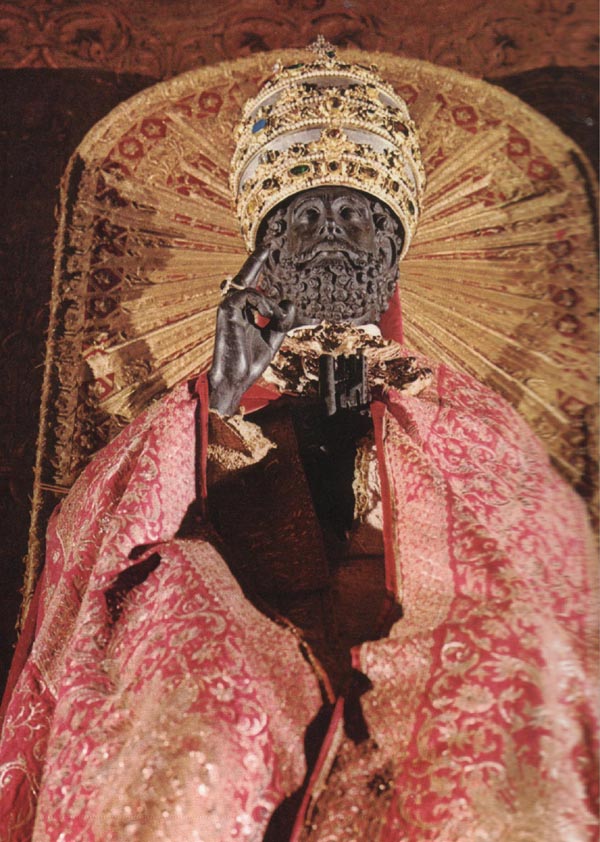
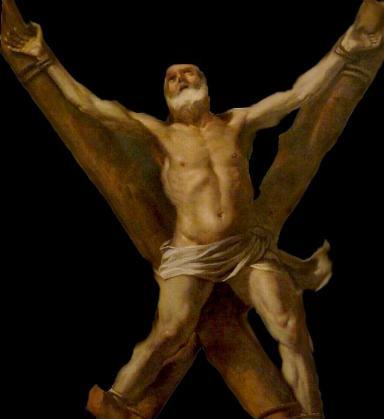




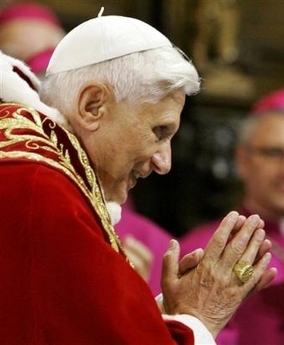






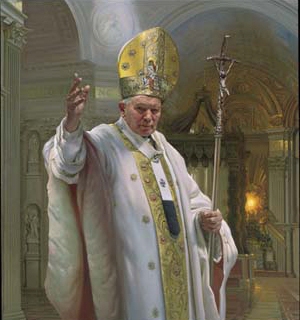
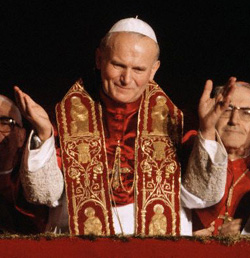
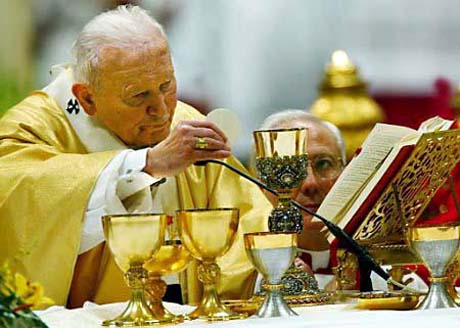







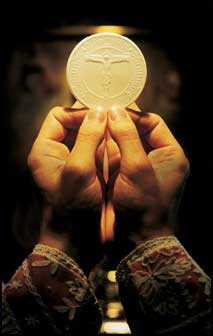
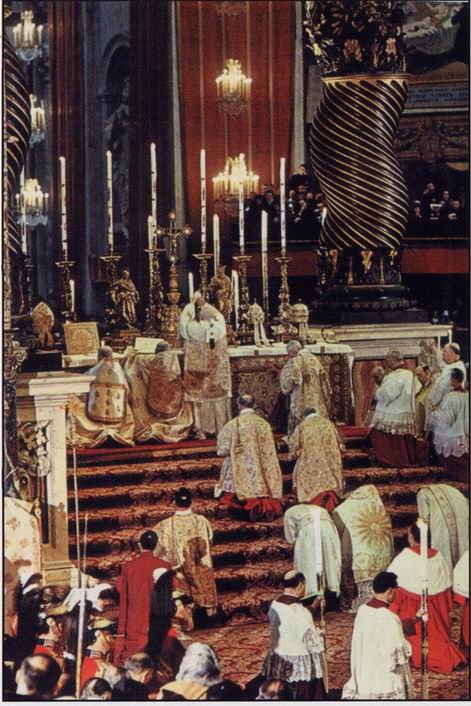

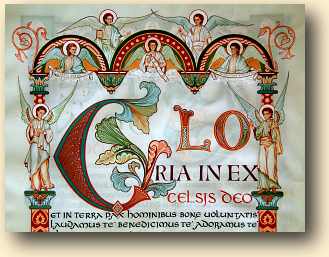

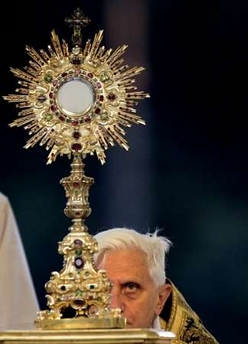


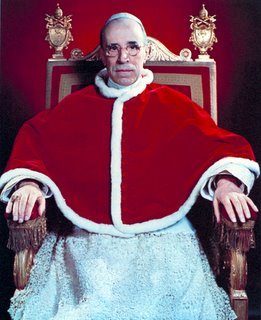




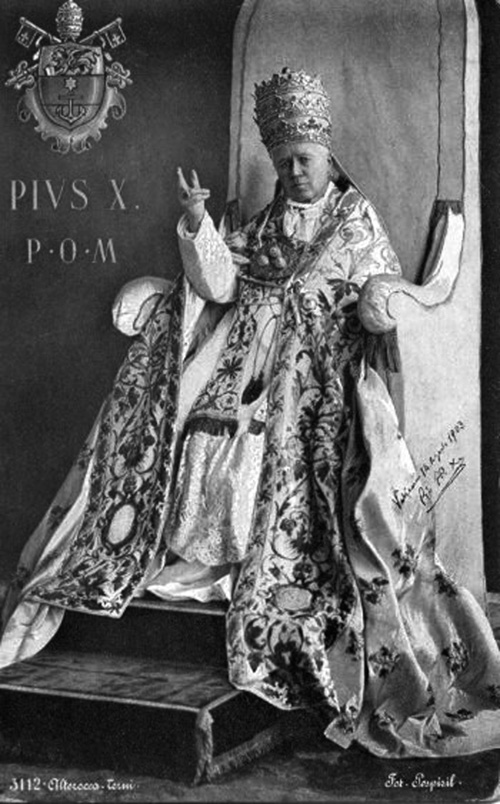



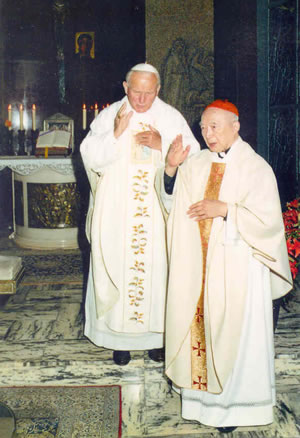






No comments:
Post a Comment